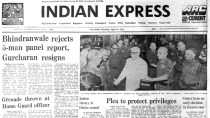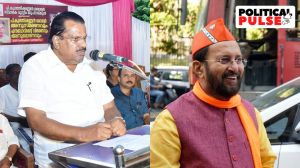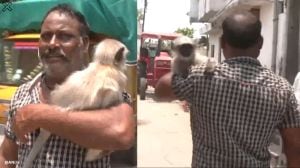- India
- International
Indira Gandhi’s nadir
After the 1977 election, she seemed to have reached the road’s end.
 Since the three top leaders of the Janata-Congress for Democracy alliance were claimants to the office of prime minister, Indira Gandhi taunted her adversaries that they did not even have an identifiable leader as their future prime minister.
Since the three top leaders of the Janata-Congress for Democracy alliance were claimants to the office of prime minister, Indira Gandhi taunted her adversaries that they did not even have an identifiable leader as their future prime minister.When, on January 18, 1977, Indira Gandhi announced fresh elections in March she stunned the country. But few had any doubt about the poll’s outcome. Her defeat was a foregone conclusion. Especially after a memorable speech at a mammoth meeting at Delhi’s Ramlila grounds by Atal Bihari Vajpayee, during which he told the huge and exuberant audience not to vote for her because that would once again convert India into a “gargantuan prison”. Anger against “compulsory” vasectomies, forced “resettlements” and other “excesses” of the Emergency was visible to the naked eye. And then a succession of new and unexpected events hit the prime minister hard.
The first was the declaration by JP, as Jayaprakash Narayan continued to be called, of the merger of the Congress (O), the Jan Sangh (the forbear of today’s BJP), Bharatiya Kranti Dal (a party of powerful peasantry in north India) and the Socialist Party into the newly formed Janata Party. The sudden disappearance of the multiplicity of opposition parties was a big blow to the Indira Congress. As if this were not enough, on February 2, Jagjivan Ram, a very senior minister in Indira’s cabinet and a towering leader of the scheduled castes (now called Dalits) resigned from both the cabinet and the Congress. Ironically, he had meekly piloted the resolution seeking Parliament’s approval of the Emergency proclamation! He was promptly joined by H.N. Bahuguna, an astute politician who was formerly Congress chief minister of the politically key state of Uttar Pradesh, whom Indira had sacked unceremoniously in November 1975. He was followed by Nandini Satpathy who, unlike Bahuguna, had been a long-time favourite of Indira’s but was disliked by Sanjay Gandhi because of her Communist past and therefore pushed aside. The trio lost no time in forming a new party, named it “Congress for Democracy” and entered into an alliance with the Janata.
Around this time I decided to travel extensively, particularly across the heartland states of Bihar and UP that elect a fourth of the Lok Sabha’s entire membership, to discern the public mood. Everywhere I went, whether a tiny village or a big city, the support for the Janata-CFD combine was manifest. At the alliance’s meetings, enthusiastic crowds chanted: “Vote bhi dein ge aur note bhi dein ge (we will give both votes and currency notes).” At every meeting the donations were generous. Although February and March that year were unusually cold months, the Janata’s meetings lasted until very late in the evening. At one such meeting, a young man delivered a very short speech, telling his audience in Hindi: “If you want to vote for Indira and Sanjay, please do. I will happily go back to jail because after my last imprisonment, I discovered that fellow villagers had looked after my mother very well. But don’t blame me for the music you would have to face.” For quite a few minutes everyone present shouted: “None of us will ever vote for mother and son.”
Meanwhile, Indira was not sitting idle. She hit the campaign trail with her usual vigour. But she discovered to her dismay that crowds attracted by her were no longer as large as they used to be. Worse, even those who came to her meetings were no longer exuberant but listless. Yet she lampooned the Janata as khichdi, which means both a hotchpotch and a rice-and-lentil dish to be given to those with impaired digestion. Since the three top leaders of the Janata-CFD alliance — Morarji Desai, Charan Singh and Jagjivan Ram — were claimants to the office of prime minister, Indira taunted her adversaries that they did not even have an identifiable leader as their future prime minister. Charan Singh retorted: “Our leader will be elected by the parliamentary party; theirs is born from the mother’s womb.”
On reaching Lucknow — after having traversed through the countryside and several large towns of UP — I was convinced that Indira and her favourite son had reached the road’s end. At an elite dinner at which a cross-section of the upper crust, including both serving and retired top officials, was present, the police chief asked a guest who apparently owned three petrol pumps, whether it was true that he was giving petrol to the Janata without payment. “Yes, I am so doing, and doing it most willingly… Were you unaware that throughout the Emergency, Sanjay’s goons had forced me to give them petrol for free?” Some of the guests applauded him. The next morning, Indira’s own aunt, Sheila Kaul, told me that the Congress in UP had destroyed itself. Even more revealing was a conversation with a friend and fellow journalist, a Muslim and a lifelong supporter of Nehru and Indira. With tears in his eyes he said: “Inder Bhai, these vasectomies have become for us the greased cartridges of 1857.”

Election results started coming on March 20. Within an hour it was clear that the Congress was wiped out in whole of north India, but Indira had retained her support in the south rather well. At her nadir she still had 154 members in the Lok Sabha and a third of the total vote (not a measly 44 seats in the House and 19 per cent of the vote, as at present). The catastrophe, however, was that both Indira and Sanjay had lost their own seats, she to her old foe, socialist Raj Narain, who had coined the slogan “Indira Hatao”, and he to a non-entity. High-level efforts were made to get the counting of votes in her constituency suspended but the young returning officer had resisted all pressures. Therefore, the news of her defeat came in the wee hours of the morning. Yet enormous crowds were waiting for it outside newspaper offices. When the official announcement was made, tens of thousands of people started dancing with joy, chanting “pehle haari court mein aur ab ha haari vote mein (she lost first in the court and now in the vote”. The Economist summed up all in just three words: “The Empress Overthrown”.
The writer is a Delhi-based political commentator
EXPRESS OPINION
More Explained
Apr 26: Latest News
- 01
- 02
- 03
- 04
- 05











































